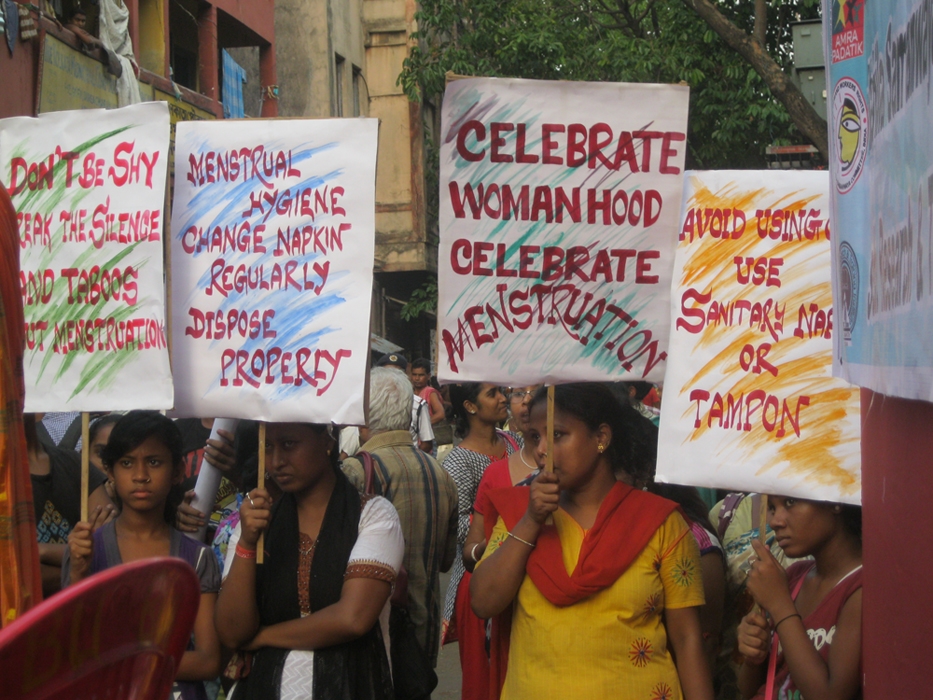Kanchi Uttamchandani, Contributor
Featured image courtesy of Amra Padatik
Menstruation.
A word that always conjures conflicting feelings among the general public. And why not? After all, it is one of the most misunderstood feminine concepts of all time.
Broadly speaking, this contentious topic has become politicized in the sense that it has been the subject of three important socio-historical phases, namely the stigmatization and shaming of periods, medicalization of menses, and the large-scale capitalist commercialization.
These three phases are persistent across Asian and Western cultures. Social conditioning through regressive religious and cultural rituals coupled with misleading advertisements have created negative messages about menstruation being undesirable, impure, and dirty.
Even in this age of social media and open-mindedness, restrictions and judgement persists. An example of this is when Instagram decided to censor artist Rupi Kaur’s image featuring period stains under the pretext that it violated the site’s community guidelines.
Why is it that a perfectly normal biological process is banned from social media platforms, but pornographic and degrading images of women are splashed all over the media?
Unflattering adjectives are used to describe menstruation, such as riding the crimson wave, the rag, the curse, the whisper, and the secret. In commercial advertisements, blue liquid continues to be shown, which reinforces traditional menstrual notions of inconvenience, handicap, and concealment.
Yes, periods can be a physically taxing process for some women, but it does not have to be viewed as a burden or a disease.
Because it’s not.
It is a sacred life-giving process meant to be cherished and celebrated, not shunned.
It is ironic that on one hand, society demands women to be sexually fertile and capable of childbearing, which is only possible through regular periods, but on the other hand, it perpetuates a culture of disdain and menstrual taboo.
This is just one of the many subliminal messages programmed into society – that women’s bodies can be exploited as sex objects, but mentioning biological experiences is forbidden.
Medicalization and commercialization of menstruation is a reference to the pharmacological treatments and drugs produced every year to supposedly treat the sickness of menstruation.
Though some women experience incapacitating pain, the pharmaceutical industry has wrongly taken advantage of this by capitalizing on their pain. They create a multibillion dollar feminine hygiene industry that sells products to fix what are actually natural conditions or non-existent problems.
The pop-a-pill trend is further popularized through deceptive marketing campaigns, which have resulted in a cocktail of hormone intervention therapies and birth control pills for menstrual suppression and to treat menopause so that it does not breed further health complications.
Such treatments are often unnecessary, experimental, and can adversely impact women’s health. The only party that stands to gain benefits are the shareholders of pharmaceutical companies such as Procter & Gamble, Kimberly-Clark, and Pfizer. These companies reap enormous profits through menstrual commercialization and consumerism, including the medicalization of premenstrual syndrome and over-prescription of antidepressants to treat it.
It is such a profit-driven industry that tampon tax and tariffs continue to exist, making it largely inaccessible to millions of girls and women, resulting in increased school dropout rates and extended absences from work. This is a gross violation of human rights as sanitary products are not a luxury, but a basic need of the female body.
It is high time we unite together to change the conversation around menstruation and emerge as period positive, which de-stigmatizes menses and breaks down the social notions of psychological or physical diseases and the idea that periods are repulsive and a liability.
Let’s move beyond the concept of idealized femininity that hides menstruation and embrace an intersectional approach to menstruating bodies with consideration of diverse aspects such as race, class, sexual orientation, and women with disabilities.
Tweet us, @excaliburYU


